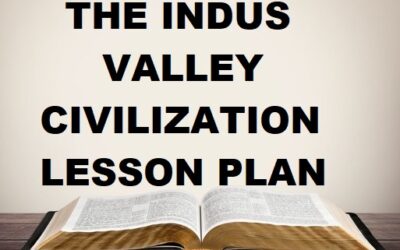Class VI Civics Chapter 6 Rural Administration Lesson Plan
Welcome to “Rural Administration,” Chapter 6 of the Class VI Civics textbook. In order to promote thorough learning, Bloom’s Taxonomy will be used in this lesson plan. Helping students comprehend the complexities of rural administration in India is our unique goal.
Remedial procedures like peer tutoring and additional reading materials will be offered in order to guarantee a well-rounded educational experience. Group discussions, dummy panchayat meetings, and presentations will all be part of the class activities that encourage critical thinking and active engagement. Let’s set out on this quest to investigate the origins of rural administration (management) in our country.
Class VI Civics Chapter 6 Rural Administration Lesson Plan
Topic: Rural Administration
No. of Periods: 06
GENERAL OBJECTIVE:
Firstly, to develop interest in the subject.
Secondly, to prepare young learners to participate in civic society.
Thirdly, encourage students to participate in public affairs.
Finally, to provide basic knowledge and understanding about the Rural Administration to the children.
SPECIFIC OBJECTIVE:
- Understanding the Structure
- Respect local government
- Challenges Analysis
- Encourage Active Civic Participation
TEACHING AIDS:
- Visual aids such as charts and diagrams
- Maps
- Case Studies
- Audio-Visual Resources
- Organizing role-playing exercises
Class VI Civics Chapter 6 Rural Administration Lesson Plan
CHECKING PRIOR KNOWLEDGE:
The teacher asks a few questions to check their prior knowledge:
- Who is the head of the country?
- Who looks after the work in the state?
- Can you tell who is the head of your school?
- Who is the head in a village?
METHOD: STORY TELLING
Raju was a knowledgeable old guy who formerly resided in the village of Sundarpur. Like many rural places, Sundarpur had problems with an inconsistent water supply and inadequate medical services. One day, the village decided to elect a new Sarpanch, and Raju was given the task.
He wished to bring about positive change and believed in the strength of community involvement. Regular Gramme Sabha meetings were set up by Raju with assistance from his fellow villagers, during which time they addressed important concerns and made improvements.
Raju taught the villagers about their rights and duties in rural governance through storytelling and open discussions. They made the decision to construct a modest clinic for essential healthcare requirements and a community well for dependable water availability.
Sundarpur changed over time. The residents actively participated in local decision-making, and clean water flowed freely and heath conditions improved. Sundarpur had been transformed into a role-model community where everyone prospered together thanks to Raju’s leadership and the force of rural administration.
The tale of Sundarpur serves as an example of the importance of rural government while highlighting community involvement, problem-solving, and advancement via teamwork.
Class VI Civics Chapter 6 Rural Administration Lesson Plan
ACTIVITY 1
TOPIC:
Mock Gram Sabha meeting.
Learning Objective:
By actively participating in a simulated Gramme Sabha meeting, students will obtain a practical grasp of the decision-making procedure in rural administration and strengthen their critical thinking abilities.
Description:
Preparation: Assign roles to groups in the class, such as that of the Sarpanch, Panchayat members, and villagers. Give each group a specific rural issue to discuss (such as access to clean water, school improvement, or healthcare). Ask them to investigate the problem they were given and to create a plan for discussion during the fictitious Gramme Sabha.
Conduct the fictitious Gram Sabha meeting in the classroom.
Each group outlines the issue, potential fixes, and anticipated results in their proposal.
Encourage dialogue and disagreement between the “Panchayat members” (other students) and the “villagers” (students).
Decision-Making
Put each idea to a vote after careful consideration. The results of the voting process and the justifications for the choices chosen should be discussed.
Reflection
After the activity, have a session of reflection. The difficulties encountered during the meeting, the value of citizen involvement, and the effects of rural administration choices on the community should all be discussed with the students.
Benefits
This activity encourages participation and active learning.
It encourages communication and teamwork.
Students develop a hands-on understanding of the Gramme Sabha’s function in rural governance.
It promotes decision-making, problem-solving, and critical thinking.
Students gain a deeper understanding of the difficulties of rural governance and how it affects communities.
ACTIVITY 2
The following five open-book questions pertain to the chapter on rural administration without a doubt:
Q1. Describe the organisation of rural administration in India using the information from your textbook or the lecture notes. Describe the main elements and their functions.
Q2. Explain the significance of the Gramme Sabha in the context of rural administration using your resources. How does it advance democracy at the local level?
Q3. Describe the project’s goals, tactics for achieving them, and results.
Find out more about the roles and duties of a Sarpanch in a Gramme Panchayat. How does the Sarpanch support local development and government?
Q4. To address the difficulties faced by rural administrators in ensuring access to high-quality education in remote areas, consult your textbook or other trustworthy sources. How can these problems be effectively solved?
These open-book questions encourage students to think critically and apply their understanding of rural administration to actual situations, in addition to simply recalling material. It gauges their comprehension of the concepts in the chapter while encouraging critical thinking and research abilities.
ASSESSMENT CRITERIA:
The activities will be assessed on the following criteria:
- Open-Book Questions: Accuracy (05 points)
- Relevance (05 points)
- Depth of Understanding (05 points)
- Organization (05 points)
Rural Administration Lesson Plan as Per Bloom’s Taxonomy
CLASSWORK:
1. Fill In The Blanks:
The teacher prepares 10 questions from the chapter for classwork.
- In rural areas, the __________ is responsible for the overall administration and development.
- The head of a village in India is called the __________.
- The Gram Panchayat is responsible for implementing various __________ programs in rural areas.
- The Gram Panchayat is elected by the __________ in the village.
- The Gram Panchayat carries out various __________ activities in the village.
- The elected head of a Gram Panchayat is known as the __________.
- The __________ is responsible for the collection of land revenue in rural areas.
- The development and maintenance of __________ are one of the responsibilities of the Gram Panchayat.
- The government-appointed officer who supervises the work of the Gram Panchayat is called the __________.
- The village-level government body responsible for solving disputes and maintaining peace is known as the __________.
2. Group Discussion
Topic:
“Women’s Participation in Rural Governance: Bridging the Gender Gap”
To begin with, this topic centers around the role of women in rural administration and governance.
Further, students can debate the importance of increasing women’s participation in Gram Panchayats and other local self-government bodies.
Can also discuss the challenges women face in rural politics, and analyze the impact of women’s involvement on rural development and gender equality.
HOMEWORK:
Firstly, the teacher will give students a case study to analyze that relates to problems with rural administration in a particular area or nation, whether it be actual or made up. Ask students to examine the case study and respond to inquiries like: What are the main difficulties faced by rural administrators in this situation?
- What are some possible tactics or methods to deal with these problems?
- Mention the effects do local cultural, social, and economic issues have on rural administration?
- What part may community involvement and government policies play in enhancing rural administration?
Secondly, the teacher ask pupils to assume that they have been chosen to serve as rural administrators for a particular hamlet or rural region.
Charge them with coming up with a detailed development plan for the selected village.
The project needs to address issues including infrastructure development (roads, schools, hospitals, etc.).
LEARNING OBJECTIVE:
- Understanding Rural Governance: Students should be able to define the components of rural governance systems, such as local government institutions and the agencies in charge of rural development.
- Analysing Rural Challenges: Students should learn how to recognise and evaluate the particular difficulties that rural communities confront, such as problems with infrastructure, healthcare, education, and poverty.
- Knowledge of key government policies and initiatives for rural development can help you assess how well they are handling rural challenges.
- Community Engagement: Recognise the significance of community involvement in rural administration and learn techniques for involving local citizens in development projects and decision-making processes.
Strategic Planning: Gain knowledge of how to create and carry out detailed plans for rural development that take into account the economic, social, and environmental requirements of rural communities.
REMEDIAL MEASURES:
Visual Aids and Simplified Materials:
Firstly the teacher will provide visual aids such charts, graphs, and maps to aid slow learners in better understanding complicated ideas.
Practical exercises and hands-on learning:
Secondly, the teacher Includes practical, hands-on exercises and activities in his/her teaching strategy.
Experiential learning is frequently advantageous for slow learners.
Class VI Civics Chapter 6 Rural Administration Lesson Plan
CONCLUSION:
At the end, with definite goals in mind, the “Rural Administration Lesson Plan” for Class VI Civics has been created to give pupils a thorough understanding of rural governance and administration. The learning objectives centre on giving students an understanding of the design and operation of rural administrations, arming them with information on local self-government, and cultivating an understanding of the significance of rural development.
The lesson plan’s lively and interesting activities encourage students to investigate real-world situations, role-play, and have group discussions. The evaluation criteria are concentrated on assessing students’ understanding, critical thinking, and capacity to connect theoretical ideas to real-world contexts
At last, remedial methods, such as individualised conversations, additional reading materials, and practise tasks, have been included to fill in any knowledge gaps. In addition to providing students with essential information, this lesson plan fosters future engaged citizens by instilling a sense of responsibility for rural communities and their growth.





0 Comments